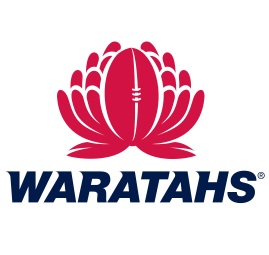 The Waratahs have reached the final of the 2014 Super Rugby Tournament.
The Waratahs have reached the final of the 2014 Super Rugby Tournament.
One may be excused for thinking that the team consists of 23 players and maybe half a dozen more as back up, but that’s not quite the full picture.
Ever wondered how many people are really behind the scenes to see that the 23 on the field are primed and ready to go?
We take an exclusive look at the full management team of the Waratahs.
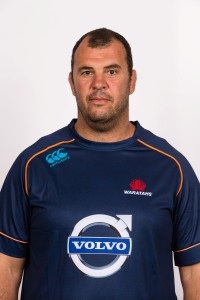
Michael Cheika
Michael Cheika – Head Coach:
Profile:
Date Of Birth: 04/03/1967
Coach Michael Cheika’s first year in charge of the NSW Waratahs saw him ring the changes and has left him excited about the challenges ahead.
The coach’s goal is for a top two finish in 2014 and from there it’s up to the NSW Waratahs to deliver their first ever Super Rugby title.
Born in Sydney, 45-year-old Michael Cheika took over as the Waratahs’ Head Coach in October 2012, returning to his home state after leading Irish Province Leinster to Heineken Cup glory and spending two seasons as director of rugby with French Top 14 side Stade Français.
Cheika made the move to coaching after playing over 300 games for the famous Randwick club. In 14 seasons with the Galloping Greens, he won seven Shute Shield Premiership titles between 1985 and 1999, captaining the side in his last two seasons.
The tough No. 8 made 212 first grade appearances and is the club’s sixth most capped player of all time. In June 1988, he played alongside the likes of David Campese, Gary Ella and Ewen McKenzie and Simon Poidevin as Randwick took on the touring All Blacks in one of the most memorable rugby matches ever played in Australia.
As well as playing for Australia U21s (1988) and representing NSW on their spring tour of the UK in 1997, Cheika played in Europe, representing French Division 1 side Castres Olympique (1989/90 and 1990/91) and Division 2 outfit CASG Paris (1991/92) before spending two seasons on the Tuscany Coast with Rugby Livorno, where he played alongside David Knox, between 1992 and 1994. In 1993 he represented an Italian Selection XV against the All Blacks.
Hanging up his boots in 1999, Cheika kicked off his coaching career at Padova, where he spent a year as head coach of Series A side Petrarca. He returned to Australia to take charge of Randwick in 2001. His three year tenure with the Galloping Greens culminated in the club winning both the first and second grade Premiership titles in 2004.
In May 2005, Cheika replaced Declan Kidney as Head Coach of Leinster, where he stayed for five years, overhauling the squad and leading the province to a first ever Heineken Cup Victory.
In his first season he took Leinster to a Heineken Cup semi–final, losing 30-6 to eventual champions Munster at Lansdowne Road.
Despite failing to qualify from their Heineken Cup pool in 2007/08, Leinster ended the season as Celtic League champions for the first time since 2001. Sealing the title with a six-try 41–8 victory over Newport Gwent Dragons in front of a sell-out crowd at their new home, the RDS Arena, the title was Cheika’s first trophy as Leinster coach.
The following season, Leinster topped their Heineken Cup pool and went on to overcome Harlequins at the Stoop, a match famous for the ‘Bloodgate Scandal’, before overcoming their underdog status to topple Munster 25–6 in the Croke Park semi-final. Watched by a crowd of over 82,200, the match broke the world record attendance for a club rugby union game. Their 19-16 final victory over English Premiership champions Leicester Tigers at Edinburgh’s Murrayfield Stadium saw the Province claim its first every European crown.
When he left for Stade Français in June 2010, the club was known as the market leader. Having overhauled the club’s entire rugby operations, from the training facilities and techniques, to the team’s player recruitment and retention policies, the club’s strong identity was reflected in a 400% increase in season ticket holders.
Also a successful businessman, in 2001 he set up fashion distribution company, Live Fashion, opening a worldwide distribution network three years later. Founded on the same three fundamental disciplines of his coaching success; leadership, management and technical expertise, in 2010 when he sold the company, it employed 20 staff across Sydney London and Hong Kong. He remains on the board of directors.
He lives in Sydney with wife Stephanie and his four children.
**********
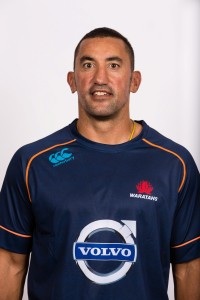
Daryl Gibson
Daryl Gibson – Assistant Coach:
Profile:
Date Of Birth: 02/03/1975
Place of Birth: Te Anau, New Zealand
Waratahs Assistant Coaching Debut: 2013 Round 1 v Queensland Reds
Other Coaching Roles: Assistant Coach, Crusaders (2008-2012); Assistant Coach, Maori All Blacks (2010, 2012); Backs Coach, Glasgow Warriors (2007/08).
Former All Black centre and Crusaders’ assistant coach Daryl Gibson joined the NSW Waratahs’ coaching team in November 2012, bringing with him a wealth of international coaching and playing experience.
His expertise is attack and continuity around the ruck and it didn’t take long for it to rub off on the Waratahs. In his first season, the Waratahs had more offloads and ran for more metres than any team in Super Rugby, were number two in linebreaks and kicked the ball less than anyone in the competition.
Gibson’s aim for 2014is to help turn the Waratahs into a winning team and stay true to the Waratahs’ tradition of playing the running game.
In 2011, Gibson helped guide the Crusaders to the Super Rugby final, securing semi-finals places in 2009, 2010 and 2012, having previously won four titles as a player. At the end of 2012, he coached the Maori All Blacks on their tour of Europe.
As an inside centre, Daryl Gibson played 19 Tests for the New Zealand All Blacks between 1999 and 2002, including the 1999 Rugby World Cup. He made a team record 78 appearances for the Crusaders in Super 12 between 1996 and 2002, scoring 14 tries and winning four championships in 1998, 1999, 2000 and 2002.
After making his debut in June 1993, he went on to play 80 matches for Canterbury, claiming 35 tries and twice winning the New Zealand Provincial Championship in 1997 and 2001. As captain, he guided the team to the final in 2000.
Daryl appeared in all five games for the New Zealand Maori on their 1998 tour of Scotland and was called in to the New Zealand Barbarians’ side that played England at Twickenham in December 2003.
He left the Crusaders to join the Bristol Shoguns in 2002, moving to Leicester Tigers at the end of 2003 following Bristol’s relegation. He played over 90 games for Leicester, winning the Guinness Premiership title in 2006/7 with a 44-15 win over Gloucester and making the finals on several other occasions. At the start of the 2007/8 season he moved north to play for Glasgow Warriors in the Magners League, where he was a player as well as a backs coach.
**********
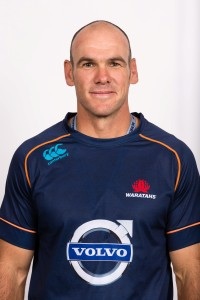
Nathan Grey
Nathan Grey – Assistant Coach:
Profile:
Date Of Birth: 31/03/1975
Waratahs Assistant Coaching Debut: N/A
Other Coaching Roles: Assistant Coach, Melbourne Rebels (2011-2013); Player/Coach, Kyuden, Japan (2005-2010)
One of the state’s most capped players of all time, former Wallabies and NSW Waratahs centre Nathan Grey returns home to NSW to join the coaching team for the 2014 Super Rugby season.
He brings with him a wealth of coaching experience and specialist defence skills honed during a five-year stint with Japanese side Kyuden and three seasons with the Melbourne Rebels.
As a player, Grey was known as an aggressive, go-forward centre with strong defensive skills. After making his NSW debut in 1997 and going on to earn 94 state caps and score 21 tries in nine seasons with the province. He still remains the state’s most capped centre in history (92 of his caps were earned at centre, with one at flyhalf and one at flanker) and ranks 16th amongst the Waratahs’ top try scorers of all time.
On the international stage, Grey made his Wallabies debut off the bench against Scotland in June 1998, scoring a try in their 33-11 win in Brisbane. His seven-year career saw him win 35 Test caps and encompassed two Rugby World Cups: he was part of the Rod McQueen-coached World Cup-winning 1999 team, taking the field in the closing minutes of the final and was also a member of the 2003 squad.
Kicking off his coaching career with a move to Japan, his five-year stint as player/coach saw him help his Kyuden side achieve promotion to the Top League for the 2007-8 season.
In 2011, Grey was recruited to Melbourne’s new Rebels franchise by the team’s founding coach Rod McQueen, he spent the inaugural season as skills coach before being promoted to assistant coach under Damien Hill.
***********
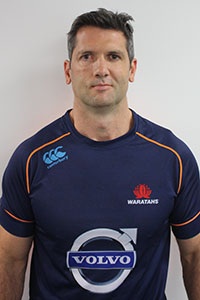
Tim Kelaher
Tim Kelaher – Chief Scout:
Profile:
Date Of Birth: 24/07/1970
Playing career: St Josephs College 1st XV (1988-1989), GPS 1st XV, NSW Schoolboys 1st XV and Australian Schoolboys (1989), Eastwood 1st Grade, NSW Under 21s, Emerging Wallabies (1990) Randwick 2nd and 1st Grade (1991–1996), Australian Hong Kong 7s representative (1992), Wallabies (1992-1993), NSW Waratahs (1992-1996), NSW Country (1992-1995), Sydney University 1st Grade (1997-1999), Narrabri Blue Boars, Central North NSW Country Rugby (2005-2010), Classic Wallabies (2010-2011).
Tim Kelaher joined the HSBC Waratahs in May 2013 in the newly-created role of Chief Scout.
Underlining the HSBC Waratahs’ commitment to the long-term development of home-grown talent, Kelaher is responsible for implementing and overseeing a state-wide recruitment network that will target the most talented players from across NSW, from the age of 16 upwards.
Born in Gosford, Tim Kelaher is the nephew of legendary NSW winger, Jack ‘Jockey’ Kelaher, who earned 17 caps for the NSW Waratahs from 1932-1939 and scored 17 tries, including two in NSW’s legendary 17-6 victory over the 1937 touring Springboks side.
A former Wallaby fullback, Tim Kelaher made his debut in the 1992 Bledisloe Cup win over the All Blacks, adding another Test cap against Ireland that same year and a third against the All Blacks the following season. In a five-year career with the NSW Waratahs, he represented his state on 29 occasions between 1992 and 1996, scoring 102 points and playing in every position from 12 to 15.
An Old Boy of St Joseph’s College, his 24-year playing career spans the amateur and professional eras and encompasses schoolboy, premiership, country, sevens, state, international and Classics rugby. Born and bred in the Central Coast, he holds an MBA from the Macquarie Graduate School of Management and has three children. He now lives in Paddington.
***********
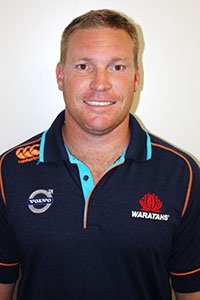
Tim Rapp
Tim Rapp – NSW Under 20’s Coach:
Profile:
Date Of Birth: 17/10/1978
Place of Birth: Singleton, New South Wales
A former NSW halfback, Tim Rapp joined the NSW Waratahs’ coaching team in March 2014 in a role that incorporates all pathway rugby across the state. A productive of NSW country rugby, Rapp went all the way from Under 12s to the first XV with his first club the Singleton Bulls.
Attending Singleton High School, he represented NSW Country Schools and NSW Combined High Schools before playing for Australian Schoolboys against Ireland and New Zealand. He also represented NSW and Australia in the IRB’s Under 19 and Under 21 World Championships.
After representing NSW Country Cockatoos in 1997, Tim moved to Newcastle and joined the Newcastle Wildfires, who at the time played in the Sydney competition.
He moved to Southern Districts in 2000, playing with them until 2005, and was selected in the Waratahs Academy before joining the NSW Waratahs from 2000 – 2002.
He made his NSW state debut against the Chiefs in 2002 and went to win a total of caps that season. Tim also represented the Australian Sevens in 2003 before finishing his playing career back with the Cockatoos in 2006.
A Bachelor of Physical Education, Tim moved straight into coaching, working with NSW Combined High Schools whilst teaching at Matraville Sports High School.
After two seasons as head coach of his former club Southern Districts from 2008-2009, he was assistant coach to the Australian Schools from 2010 – 2013. In 2012 he become Director of Rugby at Newington College, where he worked until being appointed to his current full-time role by Michael Cheika in March 2014.
He is a level 3 accredited coach and works closely with Chief Scout Tim Kelaher.
*************
Team Staff:
Sam Cashman – Logistics Manager:

Sam Cashman
Head Coach Michael Cheika’s right-hand man, Sam is responsible for much of the day-to-day logistical operations of the Waratahs both at home and on tour. It’s his third year with the Waratahs after having previously worked for the Australian Rugby Union.
Anthony Wakeling – High Performance Analyst:

Anthony Wakeling
A former analyst with the Wallabies, ‘Mudge’ and his video camera joined the Waratahs in 2008 to provide technical, analytical and statistical support to the whole team.
Haydn Masters – Athletic Development Manager:

Haydn Masters
The brains behind the Waratahs strength and conditioning program, Haydn brings much expertise having previously worked for the Western Force, ARU and London Broncos RLFC. His third year with the Waratahs and eighth in Super Rugby.
Tom Tombleson – Strength & Conditioning Coach:

Tom Tombleson
A former England Sevens player and first grader for Randwick, Tom has a master’s degree in excercise physiology and is responsible for preparing the Waratahs squad in the gym.
Keiran Cleary – Physiotherapist:

Keiran Cleary
After working with Sydney University and the Junior Waratahs, Keiran joined the squad as head physiotherapist ahead of the 2009 Super 14 season.
Maria Nibali – Sport Science & Research Manager:

Maria Nibali
Having completed a PhD at the Australian Institute of Sport, Maria has recently joined the NSW Waratahs to direct high-performance research, in particular driving the use of data analytics to enhance performance.
Alex Hill – Physiotherapist:

Alex Hill
In her second season with the Waratahs, Alex brings over 20 years’ sports physiotherapy experience, having worked with elite tri-athletes, swimmers and AFL players.
Russell Fairfax – Media and Special Projects Manager:

Russell Fairfax
A former Waratah, Russell returns after 25 years in the media to handle the team’s media commitments.
Very interesting article.
Most of these people have serious impressive CV’s and that includes the team staff. They even have a sport science and research manager in Maria Nibali who holds a Phd in sport science and who is directing high -performance research driving the use of data analytics to enhance performance. Quite a contrast to SA teams who have mostly adopted the “play till you drop” principle although they moan forever how tired their players are.
No wonder that Australia is in general or at least relatively outperforming SA in rugby despite the fact that it is only about the 7th most important sport in that country.